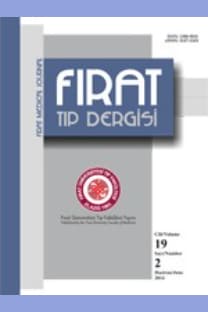Yavaş gelişen sheehan sendromu ve empty sella: Postpartum kanamanın nadir bir komplikasyonu
A case of pulmonary thromboendarterectomy
___
- 1) Sheehan HL. Postpartum necrosis of the anterior pituitary. J Pathol bacteriol 1937; 5:189-214.
- 2) Cunningham FG, MacDonald PC, Gant NF, Leveno KJ, Gilstrap LC. Williams Obstetrics 20th Edition, New-York: Appleton and Lange, 1997: 763
- 3) Kovacs K. Sheehan syndrome. Lancet 2003; 361 (8):520�22.
- 4) Muller B, Trepp R, Diem P, Christ E. das Paradoxon der TSHErho ¨hung bei Sheehan-Syndrom. Dtsch MedWochenschr 2002; 127:2610-2612.
- 5) Kaufman B. The �mpty�sella turcica, a manifestation of the intrasellar subarachnoid space. Radiology 1968; 90: 931-946.
- 6) DiZerega G, Kletzky OA, Mishell DR. Diagnosis of Sheehan's syndrome using sequential pituitary stimulation tests. Am J Obstet Gynecol 1978; 132:348-353.
- 7) Ozbey N, Inanc S, Aral F, et al. Clinical and laboratory evaluation of 40 patients with Sheehan's syndrome. Isr J Med Sci 1994; 30:826-829.
- 8) Lakhdar AA, McLaren EH, Davda NS, McKay EJ, Rubin PC. Pituitary failure from Sheehan's syndrome in the puerperium. Two case reports. Br J Obstet Gynaecol 1987; 94: 998-9.
- 9) Aron DC, Findling JW, Tyrel JB. Hypothalamus and pituitary. In: Greenspan FS, Strewler DJ (Editors). Basic & Clinical Endocrinolgy. 5 th ed, New Jersey: Appleton&Lange, 1997: 95�
- 10) Barkan AL. Pituitary atrophy in patients with Sheehan� syndrome. Am J Med Sci 1989; 298:38-40.
- 11) Ishikawa K, Sohmiya M, Furuya H, Kato Y. A case of Sheehan� syndrome associated with severe anemia and empty sella proved 48 years after postpartum hemorrhage. Endocr J 1995; 42:803-809.
- 12) Goswami R, Kochupillai N, Crock PA, Jaleel A, Gupta N. Pituitary autoimmunity in patients with Sheehan� syndrome. J Clin Endocrinol Metab 2002; 87: 4137-4141.
- 13) Abucham J, Castro V, Maccagnan P, Vieira JGH. Increased thyrotropin levels and loss of nocturnal thyrotropin surge in Sheehan� syndrome. Clin Endocrinol(Oxf) 1997; 47:515-522.
- 14) Maccagnan P, Oliveira MA, Castro V, Abucham J. Abnormal circadian rhythm and increased non-pulsatile secretion in Sheehan� syndrome. Clin Endocrinol (Oxf) 1999; 5: 439-448.
- 15) Oliveira JHA, Persani L, Beck-Peccoz P, Abucham J. Investigating the paradox of hypothyroidism and increased serum thyrotropin (TSH) levels in Sheehan� syndrome: characterization of TSH carbohydrate content and bioactivity. J Clin Endocrinol Metab 2001; 86:1694-1699.
- 16) Boulanger E, Pagniez D, Roueff S, et al. Sheehan syndrome presenting as early post-partum hyponatremia. Nephrol Dial Transplant 1999; 14:2714-2715.
- 17) Neelon FA, Goree JA, Lebovitz HE. The primary empty sella: clinical and radiographic characteristics and endocrine functions. Medicine 1973; 52: 73-92.
- 18) Meador CK, Worrell JL. The sella turcica in post-partum pituitary necrosis (Sheehan� syndrome). Ann Intern Med 1966; 65:259- 264
- 19) Sherif IH, Vanderley CM, Beshyah S, Bosairi S. Sella size and contents in Sheehan� syndrome. Clin Endocrinol (Oxf) 1989; 30:613-618.
- 20) Bakiri F, Bendib SE, Maoui R, Bendib A, Benmiloud M. The sella turcica in Sheehan� syndrome: computerized tomographic study in 54 patients. J Endocrinol Invest 1991; 14:193-196.
- 21) Chong BW, Newton TH. Hypothalamic and pituitary pathology. Radiol Clin North Am 1993; 31:1147-1153
- 22) Dejager S, Gerber S, Foubert L, Turpin G. Sheehan's syndrome: differential diagnosis in the acute phase. J Intern Med 1998; 244:261-266.
- 23) Banzal S, Ayoola EA, Banzal S. Sheehan's syndrome in Saudi Arabia. Int J Gynaecol Obstet 1999; 66:181-182.
- 24) Otsuka F, Kageyama J, Ogura T, Hattori T, Makino H. Sheehan's syndrome of more than 30 years' duration: an endocrine and MRI study of 6 cases. Endocr J 1998; 45:451-458.
- 25) Dash RJ, Gupta V, Suri S. Sheehan's syndrome: clinical profile, pituitary hormone responses and computed sellar tomography. Aust NZ J Med 1993; 23:26-31.
- 26) Orrego JJ, Barkan AL. Pituitary disorders. Drug treatment options. Drugs 2000; 59:93-106.
- 27) Guiot G. Transsphenoidal approach in surgical treatment of pituitary adenoma: general principles and indicationsin nonfunctioning pituitary adenomas. In: Diagnosis and Treatment of pituitary tumors. Kohler PO, Ross GT. (Editors) Amsterdam: Excerpta Medica, 1973: 176-206.
- 28) Olson DR, Guiot G, Derome P. The symptomatic empty sella: Prevention and correction via transphenoidal approach. J Neurosurg 1972; 37: 533-546.
- ISSN: 1300-9818
- Yayın Aralığı: 4
- Başlangıç: 2015
- Yayıncı: Fırat Üniversitesi Tıp Fakültesi
Yapay zeka teknikleri ve radyolojiye uygulanması
SELAMİ SERHATLIOĞLU, Fırat HARDALAÇ
Beta talasemi minörlü hastalarda eser element ve oksidatif hasar ilişkisi
Ali Rıza KIZILER, BİRSEN AYDEMİR, Erdal KURTOĞLU, Ayşegül UĞUR
Yavaş gelişen sheehan sendromu ve empty sella: Postpartum kanamanın nadir bir komplikasyonu
Aydın KÖŞÜŞ, Nermin KÖŞÜŞ, Metin ÇAPAR
Menenjiomlarda difüzyon ağırlıklı MRG bulgularının histopatolojik sonuçlarla karşılaştırılması
Zülkif BOZGEYİK, Tülin ÖZTÜRK, A. Ferda DAĞLI, METİN KAPLAN, Erkin OĞUR
Clinical and radiological effects of the treatment modalities in a case of arachnoid cyst rupture
Halil İbrahim SEÇER, Selçuk GÖÇMEN, Tufan CANSEVER, METİN KAPLAN, Engin GÖNÜL
Extratesticular and intratesticular varicocele: Sonographic findings (case report)
MUSTAFA KOÇ, Hanefi YILDIRIM, SELAMİ SERHATLIOĞLU
Wernicke’s encephalopathy associated with methanol ingestion
